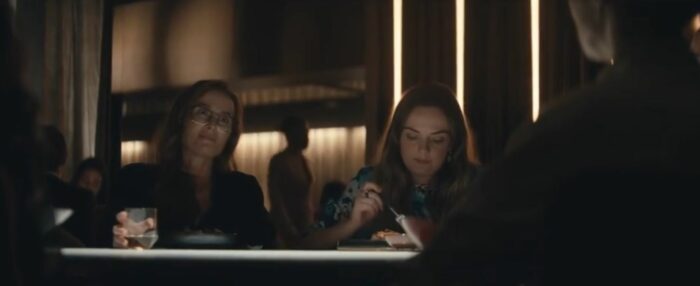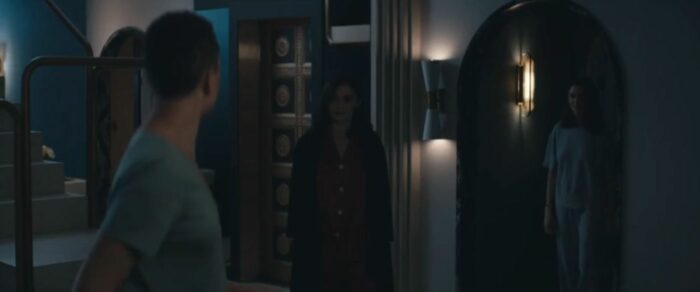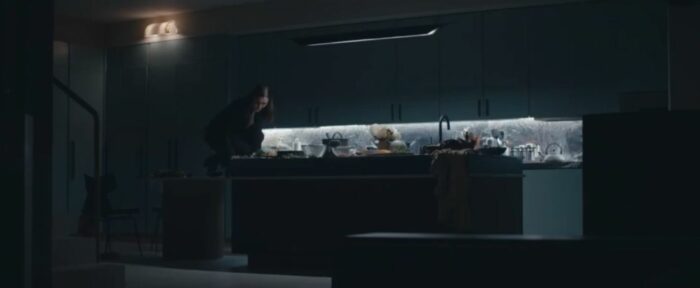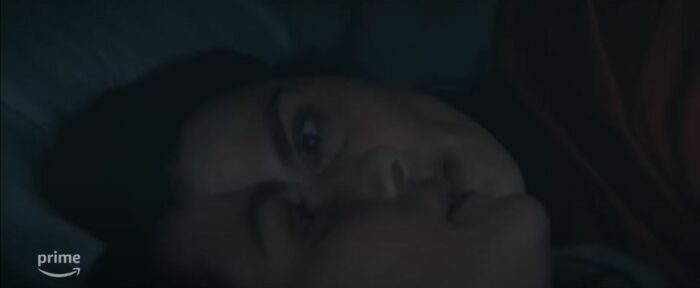The following recap contains spoilers for Dead Ringers (2023) Episode 1, “Appleseed” (written by Alice Birch and directed by Sean Durkin)
Dead Ringers (2023) is based on Dead Ringers (1988), which was based on a novel by Bari Wood (Twins) that was itself loosely based on the real lives of the Marcus twins. All of that doubling is delicious. I suggest that instead of calling this a remake we call it a doppelganger. And right out of the gate it’s a magnificent one.
I have a vague memory of seeing Cronenberg’s Dead Ringers (1988) as a child (let’s hear it for lack of adult supervision!), but I can’t claim to recall all of the details of the plot so much as I’ve been vaguely haunted by its uncanny vibe for decades. Take this as you will with regard to whether I know what’s going to happen in this series and if it is infecting what I have to say about the first episode. That’s all I’ve seen at this point, and I figure if you’re looking for a review of the whole comparing it to the film there will be plenty of others out there providing precisely that angle. I might even circle back and do that myself.
Regardless, from its inaugural episode, Dead Ringers is compelling as hell. Created for TV by Alice Birch, the series is beautifully shot (credit to Sean Durkin for directing Episode 1) and the music (credited to Barry Gold), along with the overall sound design, is perfect. I’m not sure the body horror is Cronenbergian, but it’s definitely there, if mostly in gruesome shots of birth and surgery. But that’s always the point, anyway: the horror of being embodied, which childbirth exemplifies so well.
We are all born in muck and blood. It’s beautiful and disgusting.

Further, the gender-swapping move of casting Rachel Weisz as the dual leads (where it was Jeremy Irons in the film) works brilliantly. Weisz is a great actor, of course, but beyond this there is a poignancy to Beverly’s desire to have a baby, along with her repeated failure despite her expertise, that only works because she’s a woman.
The goal of the Mantle twins feels visceral and personal, and Bev’s rant during their dinner with Rebecca Parker (Jennifer Ehle) lands powerfully. She’s absolutely right about how the system treats pregnant women as fetal containers, and we’ve seen it played out in detail over the course of the hour to this point, from the lack of attentiveness of medical staff to the way Lara (Miriam Silverman) insists she is the patient while her surrogate Nicki (Emily Donahoe) is in labor.
It’s not only men who use women (in the pejorative sense), but women who exploit one another. And the dynamics get messy, insofar as we don’t want to say that there is something wrong about using a surrogate in and of itself, any more than we want to say that it’s wrong in principle to employ a maid (as the Mantle sisters do—these aren’t working class heroes we’re dealing with). It’s not one person using another as a means to an end that is wrong; it’s doing so without respecting that person’s right to self-determination. But there are complex power structures at play that make it hard to draw that line. At some level, you might not even know whether you are exploiting someone.
Thus things are, as Bev claims, precisely systemic and not simply the fault of some given individual, who perhaps has no choice but to operate within that system. I wonder if Elliot might be prone to think of the opioid crisis and the Parkers’ role in it along similar lines, though she doesn’t make that argument to her sister. They may also go in opposite directions in thinking through what systemic problems entail when it comes to individual culpability. Do they let us off the hook, or make us all complicit?
Weisz shines in this duality of roles, as the two sisters are just similar enough that you might confuse them at various moments during the first half of Episode 1, and risk losing track when they pull a swap mid-shift, but by the end of the hour their differing personalities are impressed upon us firmly.
The standout scene in this regard is their discussion of their visions for the birthing clinic they intend to create together. Bev is clearly focused on providing a better experience for patients, while Elliot’s obsession is with the lab. She’s open to offering gene selection, and while her quips about whether Bev has been reading Marx are delightful, issues with capitalism hardly get at the depth of moral worry such possibilities represent. But we just glance across the surface of this. With a season’s worth of episodes, I wonder how far we’ll get to see these ideas develop.

The main thing, though, is in how Elliot pretends to be Bev for the purposes of seduction, which parallels the 1988 film even if it’s not exactly the same. Clearly they have been playing this game for some time, and it’s another aspect where Dead Ringers (2023) benefits from putting a woman in the lead. If you made this story with men in 2023, I can’t help but think the kneejerk negative moral judgment would be too strong to maintain the allure of the characters, but with the sisters it almost seems kind of sweet, despite the fact that we know it is most definitely not OK in ethical terms.
Bev gets flustered when Genevieve (Britne Oldford) comes to the clinic. Elliot swaps in, and then continues to meet Genevieve at the bar down the street, successfully playing things so that it can be Bev who comes to meet her at her hotel later. The deception should be off-putting, but instead I was swept up in it—first seduced by Elliot and then rooting for Bev. The performance(s) from Rachel Weisz is truly a tour de force. And here there can be no confusing who is who, at least on our end of things.
Bev brings Genevieve home, and the latter makes dinner. They’re in bed by the time Elliot arrives, and since Genevieve does not know that Bev has a twin sister, there is a rush of fear that Bev is going to be found out. At least, I felt a rush of fear. Is that the normal human reaction here?

As Elliot crawls across the counter eating leftovers, the tension builds knowing that Bev and Genevieve are in the next room. But then Elliot starkly reveals her existence the next morning, just when we thought they might get away with their duplicitous seduction. Elliot doesn’t want to get away with it; she doesn’t want Bev to see this woman again; and she can’t stomach not being filled in on all the lurid details.
Yet Bev does get away with it, insofar as Genevieve seems to buy that it had been her the whole time, even though she’d already noted the difference in Bev’s personality when they met up that evening. And this sets up the dramatic tension that will surely drive the series. Bev is going to see her again, and that’s going to drive a wedge between the Mantle sisters, in one way or another.
As Episode 1 comes to a close, we see Bev arriving to a meeting and saying her sister is dead, before we end with a cut to Elliot screaming (at least I’m pretty sure that’s how things line up). What we don’t know for sure is whether these events are in the same timeframe, or if the meeting is a cut to the future. And we actually don’t know for sure which sister is screaming out either, even if I’m pretty sure it’s Elliot.
All that is ruled out definitively is the possibility that the Elliot we’ve been seeing is actually only a figment of Bev’s imagination, even if Episode 1 does give us some brief moments of fantasy from Bev’s perspective (as when she “sees” a mother happily holding her newborn though in reality the woman has died). If nothing else, the interaction between the two Mantle sisters and Genevieve proves that Elliot exists.
But other doors are open, including that possibility that Bev likes to pretend that Elliot is dead. She tells Genevieve more than once that she’d forgotten her sister existed, so maybe there’s something to this.

Or, perhaps this is a flash to a future after Elliot’s death. We might look to the film to try to determine what is the case here, but then we also don’t know yet just how faithful of an adaptation this will be.
Dead Ringers (2023) is a doppelganger. If the original plays with the uncanny, the TV series repeats that move, and we don’t yet know what differences may await.

